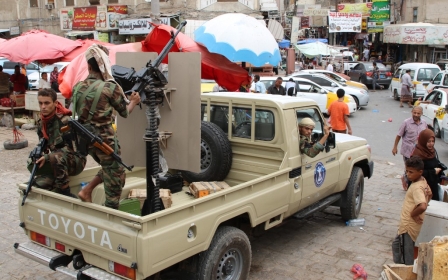Saudi-led coalition launches air strike against UAE-backed separatist forces in Aden

The Saudi-led coalition in Yemen has launched an air strike against UAE-backed southern separatists after they seized the presidential palace, fracturing the alliance that had been focused on battling Houthi rebels.
"The coalition attacked one of the areas that pose a direct threat to an important government site," Saudi state TV quoted a coalition statement as saying without specifying the target.
"This is only the first operation and will be followed by others... the Southern Transitional Council [STC] still has a chance to withdraw," it added.
Residents in Aden told the AFP news agency it was an air strike against separatist camps in the city.
The coalition had threatened military action if the separatists did not quit government military camps they seized on Saturday in the city, the temporary seat of the Saudi-backed internationally recognised government, and halt fighting.
As many as 40 people have been killed and 260 injured since the latest round of fighting broke out on Thursday, the office of the United Nations' humanitarian coordinator for the country said in a statement on Sunday, citing preliminary reports.
"It is heart-breaking that during Eid al-Adha families are mourning the death of their loved ones instead of celebrating together in peace," said Lise Grande, the UN Humanitarian Coordinator in Yemen.
"Our main concern right now is to dispatch medical teams to rescue the injured," she said in a statement on Sunday.
"We are also very worried by reports that civilians trapped in their homes are running out of food and water."
Independence movement
The UAE-backed so-called Security Belt Force (SBF) has a rival agenda to the government of Abd Rabbu Mansour Hadi but has been a key part in the coalition that intervened in Yemen in 2015.
The coalition's intervention came after the Houthis ousted Hadi from power in the capital Sanaa in late 2014.
The SBF is dominated by fighters who back the STC, which seeks to restore south Yemen as an independent state as it was from 1967-1990.
The UAE, a key coalition member that has armed and trained thousands of southern separatists, has called for calm.
Several hours after the coalition announcement, there was no indication that STC forces were preparing to leave the government military camps they seized on Saturday.
STC Vice-President Hani Ali Brik, writing on Twitter, said while the council remained committed to the coalition it would "not negotiate under duress". It had earlier agreed to a truce.
Later on Sunday, the STC leader Aidaroos al-Zubaidi said the separatists were committed to a ceasefire and were willing to work with the coalition.
In televised comments to Aden-based TV channel AIC, Zubaidi also said the separatists were willing to attend an emergency meeting in Saudi Arabia called for by Riyadh aimed at restoring order.
The separatists, who want to split from the north and are backed by the United Arab Emirates, effectively seized Aden by taking over the government's military bases on Saturday
The violence complicates United Nations' efforts to end a four-year war that has killed tens of thousands and pushed the poorest Arabian Peninsula nation to the brink of famine.
The Aden clashes began on Wednesday after the separatists accused an Islamist party allied to Hadi of complicity in a missile attack on a southern forces military parade in Aden earlier this month, which was claimed by the Houthis.
Middle East Eye delivers independent and unrivalled coverage and analysis of the Middle East, North Africa and beyond. To learn more about republishing this content and the associated fees, please fill out this form. More about MEE can be found here.





